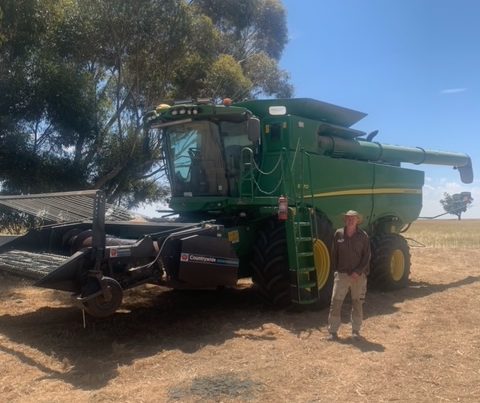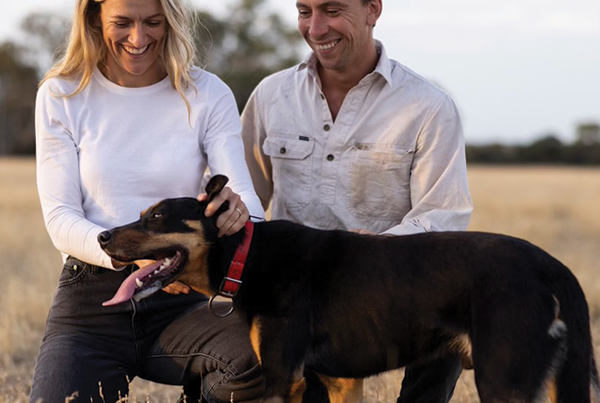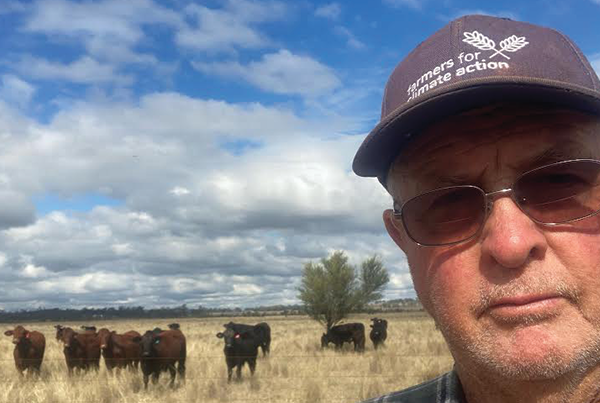
Photo: Brett Hosking and his wife, Jane with their four daughters
At a glance
Who: Brett Hosking
What: Cropping – Canola, Barley, Wheat, Oats, and Lentils.
Where: Quambatook, Vic
Brett and his wife, Jane, farm alongside their four daughters, Grace, Lily, Isabelle and Amelia at Quambatook in Victoria’s Mallee.
Jane works off-farm as the CEO of the North Central LLEN. Grace, having completed her Bachelor of Agriculture in Melbourne last year, now works for a local research and extension group, Birchip Cropping Group. Lily completed year 12 last year and is taking a gap year working locally before studying Psychology. Isabelle is currently completing year 11 and Amelia is studying grade 6. All of the girls take an active interest in the farm providing valuable help during busy seasons such as shearing, harvest, and seeding. Lily also has taken a step further buying a few cows of her own and enjoying the rollercoaster thrill of experiencing a falling cattle market having purchased when prices were strong. Brett has also been fortunate to have the opportunity to serve farmers on Agricultural boards for over 13 years. This has also involved representing farmers through the Victorian Farmer’s Federation and GrainGrowers ensuring farmers and rural communities are front of mind for our decision-makers.
Can you tell us about your property/enterprise?
Located just south of Quambatook, ours is mostly a cropping business growing Canola, Barley, Wheat, Oats, and Lentils. We do also produce some vetch hay depending on the season. To complement the cropping we also run a self-replacing flock of merino ewes using Tamaleuca bloodlines from Kevin Crook at Ouyen. From time to time we also have some beef cattle and currently are running some Hereford breeders as well as Lily’s steers.
What are some of the opportunities you see for your business/property in coming years?
Research and development has improved greatly the way we farm and our ability to adapt to seasonal conditions resulting in higher yields as well as more sustainable production. Global prices are also steadily improving as a growing global population means there is more demand for food and fibre than ever before. One of the strongest attributes Australian farmers have is our ability to produce food and fibre in a way that reflects the values of many of our trading partners, food that is sustainably produced to some of the highest food safety and grading standards meaning customers can be confident in what they buy from Australia.
And what are your main challenges now, and into the future?
The same ‘cost of living’ pressures that every Australian is feeling right now are also being felt on our farm. We have seen huge rises in the cost of critical farm inputs such as fertiliser, crop protection products and fuel. As well as this we have seen challenges with workforce including special skills that are required seasonally on farm such as shearers and mechanics.
Rising costs mean greater risk for a farmer and therefore as farmers we are employing more and more risk management processes varying from crop and livestock diversification and rotation, more sophisticated grain marketing practices and stepping further into our supply chains with more produce being sold direct to end users.
How has climate change impacted your farm business?
When I first started farming years ago a local farmer said to me that if you can successfully farm for ten years then you can successfully farm forever. What he meant was that in a ten-year period you will see the best of seasons and the worst of seasons. Whilst I feel that was absolutely true at the time, a changing climate is challenging that assumption. On the East coast of Australia in just the past five years we have seen possibly the driest farming conditions followed closely by some of the wettest. A changing climate is challenging us as growers by creating an environment for more extreme weather events from the driest droughts to the wettest floods. Our potential for late season frost has increased and the chance of summer storms damaging our ripe crops has also increased.
As farmers we continue to adapt using the best research and development and as I’ve had the privilege to meet farmers from across this country I’ve been in awe of their resilience and diversification to adapt to the season’s challenges.
Another challenge a changing climate brings is the potential for biosecurity risks. In recent years we have seen a change in the way exotic pests and diseases are moving around the globe and we need to ensure our country’s biosecurity measures are prepared for the changing landscape. From a grains industry perspective, we recently saw the pest, Fall Army Worm make its way to our country. This is a pest which thrives in a tropical climate although has been found as far south as Gippsland in Victoria which is an area that is by no means tropical! We have also seen more interceptions at our borders of pests such as Khapra Beetle suggesting that changing global climate has created new ways for these pests to move and thrive so our own biosecurity efforts need to adapt to predict changing movements of pests.
What are some of the on-far adaptations or changes you’ve been employing in recent years and what’s driving them? How successful have they been and what benefits have your seen as a result?
On farm adaption is a continual part of our business as we strive to improve the way we farm and care for our land and soil. Reduced tillage and a greater focus on soil biology and health is an important part of any modern day farmer helping to improve soil carbon, maintain ground cover throughout the year and improve water use efficiency.
Livestock are rotated around the property more frequently to maintain soil cover and at times when paddocks are vulnerable they are contained and fed.
What are your hopes for Ag in Australia, into the future?
For me the reason why I became involved with FCA was the opportunity to ensure our farmer’s are empowered and supported to both adapt their practices to manage a changing climate as well as playing an active role in helping to mitigate against further change. Having spent time working alongside farmers from across Australia I am continually inspired by their ability to find real solutions to real life challenges and I’m convinced that the more information we can give to farmers the greater their ability to find real solutions to the challenge of a changing climate.






